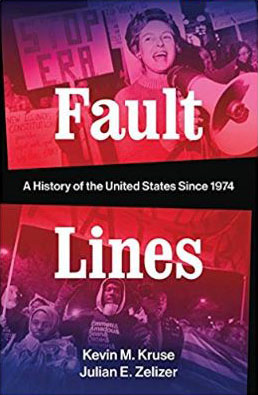— Book Review by Jens Kruse —
Kevin M. Kruse (no relation) and Julian E. Zelizer close their book Fault Lines: A History of the United States since 1974 (New York, London: Norton, 2019) with this paragraph:
The question that the United States of America now faces as a divided country is whether we can harness the intense energy that now drives us apart and channel it once again toward creating new and stronger bridges that can bring us closer together. Whether the fault lines of the past four decades will continue to fracture, or whether these rifts will finally start to heal, is a chapter yet to come. (358)

The 15 chapters that precede this ending trace the history of these fault lines through the 45 years since 1974, they “trace the political economic, racial, and sexual divisions in modern America, but also the cultural and technological changes that confronted and contorted the country along the way” (6).
The book opens with the Watergate scandal and then broadens the lens to describe, in the first four chapters, four crises: “A Crisis of Legitimacy;” “A Crisis of Confidence;” “A Crisis of Identity;” “A Crisis of Equality.” These crises of the middle to late 70s set the stage for the rise of the “Religious Right” and the “Reagan Revolution.”
The next several chapters tell the story of the struggles of the early to late 1980s: of political action and reaction, economic uncertainties and increasing inequality, of the dividing of the American populace into tribes that sorted themselves into increasingly diverse and splintered cable channels and other media.
Once the Soviet Union collapsed and the Cold War ended even that powerful unifier of American politics and society disappeared. Paradoxically, at the very moment when the strength of American democracy and values had triumphed, the restraining force of an outside competitor vanished and the weaknesses and divisions of American society came even further to the foreground.
The book then marches us through the Clinton years, the divisive election of 2000, the terror attacks of September 11, and the ensuing wars, including the domestic “war on terror,” right up to the point in 2004 when a little known state senator from Illinois delivers the keynote address at the Democratic Convention in Boston, an address that rejected the divisions of the country and sounded a call to unity.
There were many reasons for Barack Obama’s election in 2008, the economic crash of that fall among them, but it can be argued that one important reason was the message of hope first voiced in that speech.
But Kruse and Zeliser make clear that, here too, the powerful forces that carried Obama to the White House also energized powerful counterforces and created a situation in which the division and polarization of the country further increased, our polarized politics became even more toxic, and finally brought into the presidency a man whose central political strategy is division. The last chapter of the book is called “The Trump Effect.”
In what you have just read I have barely scratched the surface of this book. It is deeply researched and the fruits of that research are presented with an equal talent for the evocation of granular detail and the ability to present and explain larger historical trend lines. Especially impressive is the way that Kruse and Zeliser weave together the political, economic, social, cultural, and technological strands of the story and history of the last 45 years. It also helps that the authors are lucid and engaging writers, and very good storytellers.
One last thought: for many of us, these 45 years from 1974 to 2019 pretty much overlap with the lived experience of our adult years. It is a great pleasure to have minds and writers of the quality of Kruse and Zeliser take us by the hand and give us an explanatory tour through what just happened to us.
Fault Lines can be checked out from the Orcas Library. It is available through Darville’s Bookstore.
**If you are reading theOrcasonian for free, thank your fellow islanders. If you would like to support theOrcasonian CLICK HERE to set your modestly-priced, voluntary subscription. Otherwise, no worries; we’re happy to share with you.**







